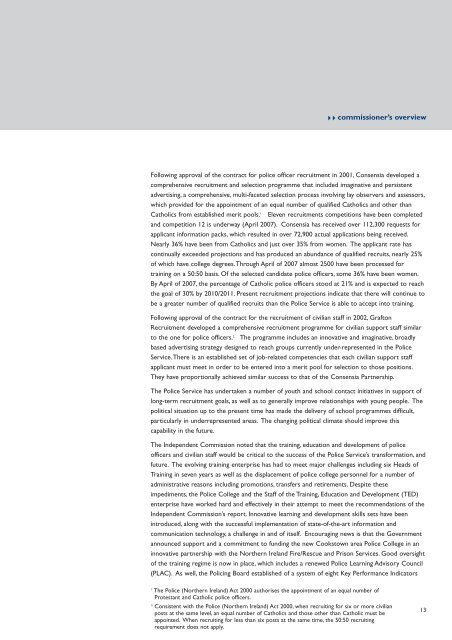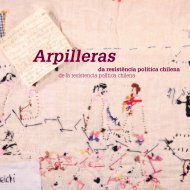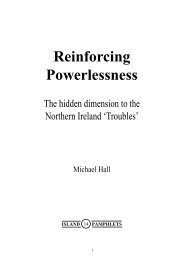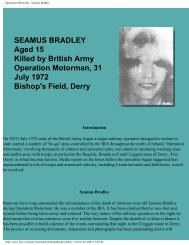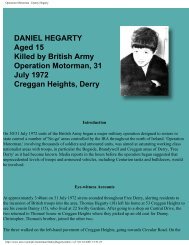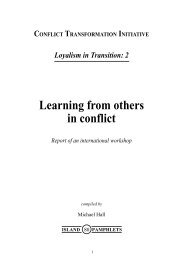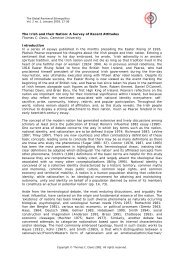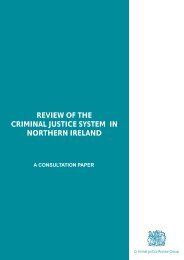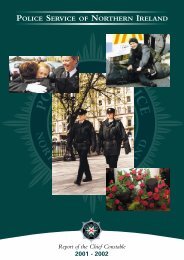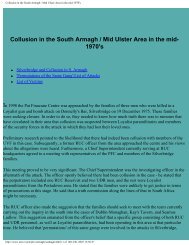11293 report 19 - CAIN - University of Ulster
11293 report 19 - CAIN - University of Ulster
11293 report 19 - CAIN - University of Ulster
Create successful ePaper yourself
Turn your PDF publications into a flip-book with our unique Google optimized e-Paper software.
commissioner’s overviewFollowing approval <strong>of</strong> the contract for police <strong>of</strong>ficer recruitment in 2001, Consensia developed acomprehensive recruitment and selection programme that included imaginative and persistentadvertising, a comprehensive, multi-faceted selection process involving lay observers and assessors,which provided for the appointment <strong>of</strong> an equal number <strong>of</strong> qualified Catholics and other thanCatholics from established merit pools. 1 Eleven recruitments competitions have been completedand competition 12 is underway (April 2007). Consensia has received over 112,300 requests forapplicant information packs, which resulted in over 72,900 actual applications being received.Nearly 36% have been from Catholics and just over 35% from women. The applicant rate hascontinually exceeded projections and has produced an abundance <strong>of</strong> qualified recruits, nearly 25%<strong>of</strong> which have college degrees.Through April <strong>of</strong> 2007 almost 2500 have been processed fortraining on a 50:50 basis. Of the selected candidate police <strong>of</strong>ficers, some 36% have been women.By April <strong>of</strong> 2007, the percentage <strong>of</strong> Catholic police <strong>of</strong>ficers stood at 21% and is expected to reachthe goal <strong>of</strong> 30% by 2010/2011. Present recruitment projections indicate that there will continue tobe a greater number <strong>of</strong> qualified recruits than the Police Service is able to accept into training.Following approval <strong>of</strong> the contract for the recruitment <strong>of</strong> civilian staff in 2002, GraftonRecruitment developed a comprehensive recruitment programme for civilian support staff similarto the one for police <strong>of</strong>ficers. 2 The programme includes an innovative and imaginative, broadlybased advertising strategy designed to reach groups currently under-represented in the PoliceService.There is an established set <strong>of</strong> job-related competencies that each civilian support staffapplicant must meet in order to be entered into a merit pool for selection to those positions.They have proportionally achieved similar success to that <strong>of</strong> the Consensia Partnership.The Police Service has undertaken a number <strong>of</strong> youth and school contact initiatives in support <strong>of</strong>long-term recruitment goals, as well as to generally improve relationships with young people. Thepolitical situation up to the present time has made the delivery <strong>of</strong> school programmes difficult,particularly in underrepresented areas. The changing political climate should improve thiscapability in the future.The Independent Commission noted that the training, education and development <strong>of</strong> police<strong>of</strong>ficers and civilian staff would be critical to the success <strong>of</strong> the Police Service’s transformation, andfuture. The evolving training enterprise has had to meet major challenges including six Heads <strong>of</strong>Training in seven years as well as the displacement <strong>of</strong> police college personnel for a number <strong>of</strong>administrative reasons including promotions, transfers and retirements. Despite theseimpediments, the Police College and the Staff <strong>of</strong> the Training, Education and Development (TED)enterprise have worked hard and effectively in their attempt to meet the recommendations <strong>of</strong> theIndependent Commission’s <strong>report</strong>. Innovative learning and development skills sets have beenintroduced, along with the successful implementation <strong>of</strong> state-<strong>of</strong>-the-art information andcommunication technology, a challenge in and <strong>of</strong> itself. Encouraging news is that the Governmentannounced support and a commitment to funding the new Cookstown area Police College in aninnovative partnership with the Northern Ireland Fire/Rescue and Prison Services. Good oversight<strong>of</strong> the training regime is now in place, which includes a renewed Police Learning Advisory Council(PLAC). As well, the Policing Board established <strong>of</strong> a system <strong>of</strong> eight Key Performance Indicators1The Police (Northern Ireland) Act 2000 authorises the appointment <strong>of</strong> an equal number <strong>of</strong>Protestant and Catholic police <strong>of</strong>ficers.2Consistent with the Police (Northern Ireland) Act 2000, when recruiting for six or more civilianposts at the same level, an equal number <strong>of</strong> Catholics and those other than Catholic must beappointed. When recruiting for less than six posts at the same time, the 50:50 recruitingrequirement does not apply.13


